中职英语拓展模块教案第六周
- 格式:docx
- 大小:31.75 KB
- 文档页数:5
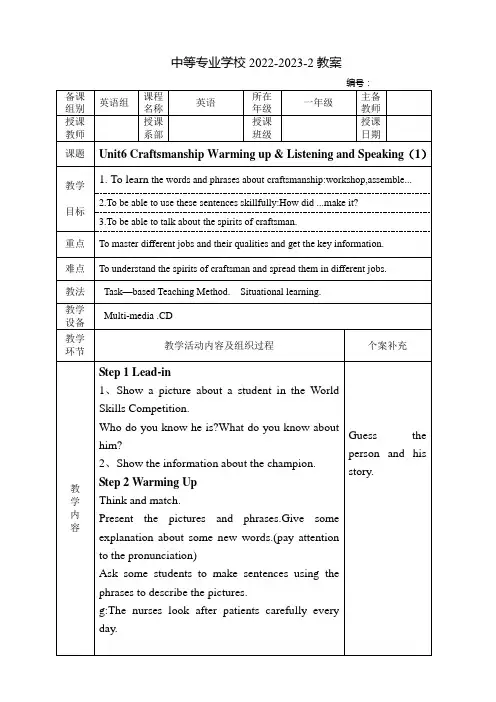
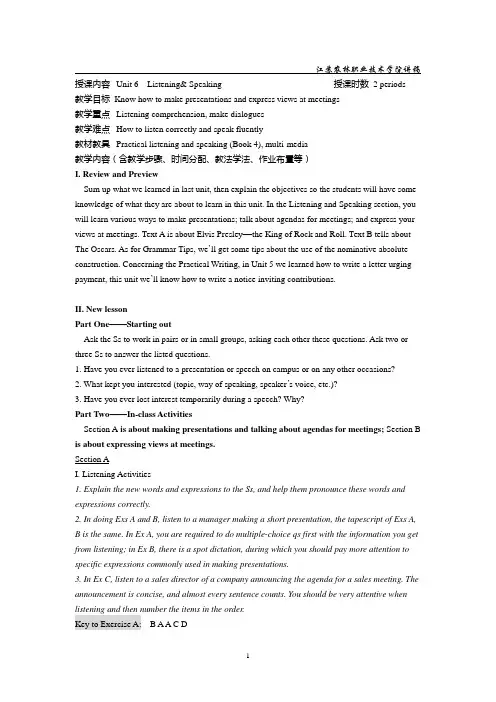
授课内容Unit 6 Listening& Speaking 授课时数2 periods教学目标Know how to make presentations and express views at meetings教学重点Listening comprehension, make dialogues教学难点How to listen correctly and speak fluently教材教具Practical listening and speaking (Book 4), multi-media教学内容(含教学步骤、时间分配、教法学法、作业布置等)I. Review and PreviewSum up what we learned in last unit, then explain the objectives so the students will have some knowledge of what they are about to learn in this unit. In the Listening and Speaking section, you will learn various ways to make presentations; talk about agendas for meetings; and express your views at meetings. Text A is about Elvis Presley—the King of Rock and Roll. Text B tells about The Oscars. As for Grammar Tips, we’ll get some tips about the use of the nominative absolute construction. Concerning the Practical Writing, in Unit 5 we learned how to write a letter urging payment, this unit we’ll know how to write a notice inviting contributions.II. New lessonPart One——Starting outAsk the Ss to work in pairs or in small groups, asking each other these questions. Ask two or three Ss to answer the listed questions.1. Have you ever listened to a presentation or speech on campus or on any other occasions?2. What kept you interested (topic, way of speaking, speaker’s voice, etc.)?3. Have you ever lost interest temporarily during a speech? Why?Part Two——In-class ActivitiesSection A is about making presentations and talking about agendas for meetings; Section B is about expressing views at meetings.Section AI. Listening Activities1. Explain the new words and expressions to the Ss, and help them pronounce these words and expressions correctly.2. In doing Exs A and B, listen to a manager making a short presentation, the tapescript of Exs A,B is the same. In Ex A, you are required to do multiple-choice qs first with the information you get from listening; in Ex B, there is a spot dictation, during which you should pay more attention to specific expressions commonly used in making presentations.3. In Ex C, listen to a sales director of a company announcing the agenda for a sales meeting. The announcement is concise, and almost every sentence counts. You should be very attentive when listening and then number the items in the order.Key to Exercise A: B A A C DKey to Exercise B: 1. introduce myself 2. give you some information 3. may I say 4. draw your attention 5. most rapid 6. need to consider 7. very risky 8. In conclusion 9. very little room for expansion 10. have any questionsKey to Exercise C: Order: 2 4 6 5 1 3II. Speaking Activities1. Studying the expressions of Ex A, pay special attention to the words or phrases in bold italics, which are very often set phrases, fixed sentence patterns or business idioms.2. Exs B and C are writing and speaking tasks. The short presentation in Ex B is quite similar to what you heard in the listening exs. You should not find the presentation here difficult to practise. Exercise A: Study the expressions used in making a presentation until you can say them from memory. Pay special attention to the highlighted expressions.Key to Exercise B: (1)introduce myself (2)The aim of my talk (3)First of all (4)draw your attention to (5)My second point (6)Thirdly (7)in conclusion (8)Thank you for your attention (9)I’ll be happySection BI. Listening Activities1. Make sure that the Ss can pronounce the new words or phrases correctly.2. In Exercise A, listen to parts of a meeting during which the participants talk about the items on the agenda, supply the missing information in the minutes of the meeting.3. Exercise B focuses on what expressions to use in order to express your views at a meeting. The expressions will be useful in doing the speaking tasks. Listen again and supply the missing words or phrases.Key to Exercise A: Part A: (2)To work out the costs (3)Carol (4) Next MondayPart B: (5)To keep the sales office telephone lines open (6) To have a trial period (7) Stephen (8) In three monthsKey to Exercise B: Part A: (1)the first item (2)go first (3)I agree (4)deal with that(5)How soonPart B: (1) The next item (2) fill us in (3) get through (4) take on (5) the extra costs(6)Why don’t we (7) take care of it (8) review (9) break for lunchII. Speaking Activities1. Studying the expressions of Ex A, read these expressions and try to remember as much as you can, esp. the words or phrases in bold italics.2. Exs B and C are writing and speaking tasks. B is quite similar to what you heard in the listening exs. You should not find the short conversation here difficult to practise.Exercise A: Study the expressions people use at a meeting until you can say them with your textbook closed. Pay special attention to the highlighted expression.Key to Exercise B: (1)the first item (2)Who wants to go first (3)What do you mean(4)How do you feel (5)our market share (6)potential customers (7) What do you think (8)What do you suggestPart Three——After-class ActivitiesSections A is on the theme of the unit. Listen to two short telephone messages about arranging for a business meeting and then do a spot dictation exercise. Sections B, C, D are of almost the same degree of difficulty as the listening section of the Practical English Test for Colleges (Level A). The format is exactly the same.Section AListen to two recorded telephone messages about organizing a conference and then supply the missing words or phrases(2) middy (3)non-meat (4)vegetarians Message 2: (1)expenses (2) hotel accommodation (3)their flights (4)share taxisSection BListen to short dialogues and choose the best answer to the question you hear after each dialogue.DAADB CBDBCSection CListen to short conversations and then choose the best answer to each question you hear.Conversation 1: CB Conversation 2: ACBSection DListen to the short passage and answer the qs by completing the statements given below.Passage 1: 1. they know 2. a house 3. solve such problems 4. lawyers 5. ExperiencePassage 2: 1. arrive in Chicago 2. the situation 3. take a taxi 4. 7:50 5. disappointedIII. Homework1. Review the expressions and sentences we’ve learned, and speak aloud after class;2. Read text A and get the main idea of it.Self-reflection授课内容Unit 6 Text A &Related Exs 授课时数 2 periods教学目标To get the main idea of Text A——Elvis Presley: the king of Rock and Roll教学重点Language points in the text (words, expressions, structures and translation)教学难点Comprehension of the text and some complicated sentences教材教具An Integrated Skills Course(4), chalks and multimedia computer教学内容(含教学步骤、时间分配、教法学法、作业布置等)I. RevisionAsk several students to give a one-minute presentation on one of the following topics:1. My hobby: advice to beginners2. How to buy a computer3. Why you should buy my company’s products/ servicesII. Lead-in1. Warm-up Activities1) Which do you prefer, classical music or popular music? Why?2) What role can art play in society, esp. when society is becoming increasingly rich materially? This section serves as a warm-up to activate students’ existing knowledge and to encourage them to share their personal experiences or opinions on the theme of the unit.①Choose a group member to lead the discussion.②Ask all group members to take notes on what others say.③Ask one or two students to report their discussion to the whole class.2. Background informationWhat is art? Perhaps, everyone knows that art is the creation of beautiful or significant things. Art includes music, dance, sculpture, painting, drawing, weaving, literature, woodworking, etc. It is a medium of expression where the individual and culture come together. Art, in its broadest meaning, is the expression of creativity or imagination. Art also is an assisted reproductive technology. Architecture is the art of planning and designing buildings. Photographs or other visual representations are a printed publication. Art shows an artist’s skill observation, and creative power. Art enriches our daily life.III. Careful Reading of Text A1) Part Division of the TextAsk Ss to read the whole text and then divide it into 3 parts:Part 1 (Paragraphs 1-2): Elvis Presley was the King of Rock and Roll and the greatest performer in America.Part 2 (Paragraphs 3-6): Elvis Presley was the King of Rock and Roll and the greatest performer in America.Part 3 (Paragraphs 7-8): Although not all people liked him, Elvis Presley still ranked 8th among the top 100 Americans.2) Language Points of the Text1. From 1956 to 1959, there was not one week when an Elvis song was not on the charts: Sentence Paraphrase: Every week from 1956 to 1959, there was an Elvis song on the charts. Sentence Translation:从1956年到1959年,没有一周埃尔维斯的歌不出现在每周流行歌曲榜上。

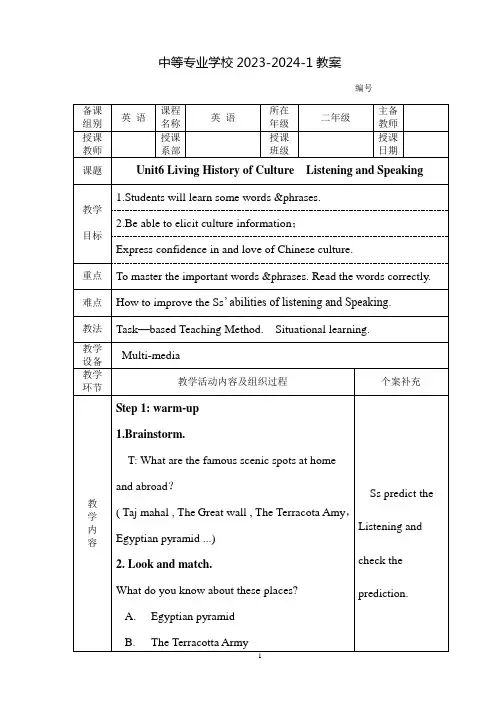
中等专业学校2023-2024-1教案编号中等专业学校2023-2024-1教案中等专业学校2023-2024-1教案中等专业学校2023-2024-1教案教学内容(C)Italians(D)Japanese Step4 conclusionStep 5: Homework板书设计Unit6 Living History of CultureWriting & Culture Understanding(1) The very first destination that I went to visit in Xi’an was Terracotta ArmyThe very first thing that we went to see in India was The Taj Mahal.by...(2)According to the passage,people inoften have aa late breakfast教后札记中等专业学校2023-2024-1教案教学内容(2)Read and group:原因状语从句:since,because,as,for...让步状语从句:even if/though, though,although,while,as...目的状语从句:in order that, so that, in case...(3)Step 3: Presentation1.Read and underline.The teacher explains the basic grammar structureand application rules of attributive clauses.I got up early so that I could get to school on time. 目的状语从句Even though I got up early, I didn’t get to schoolon time.让步状语从句Since I got up early, I got to school on time. 原因状语从句Even if/though Since So that2 1,7 5,8Ss read thesentences andsummarize theusages ofgrammar.Ss learn thebasic forms ofattributive clauses中等专业学校2023-2024-1教案。
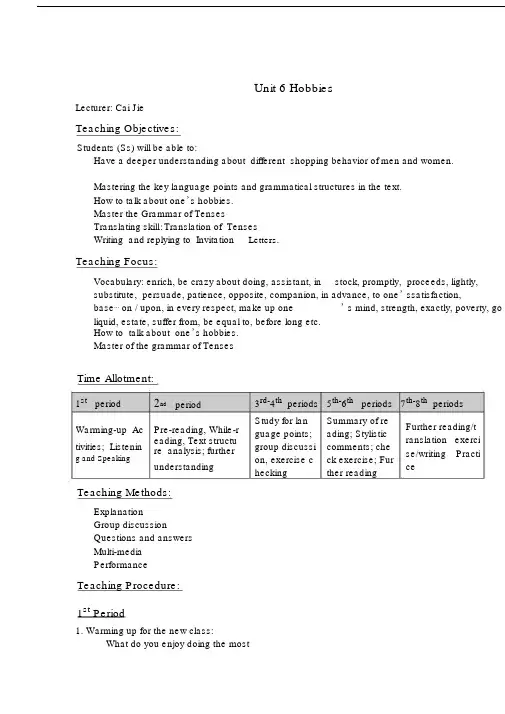
Unit 6 HobbiesLecturer: Cai JieTeaching Objectives:Students (Ss) will be able to:Have a deeper understanding about different shopping behavior of men and women.Mastering the key language points and grammatical structures in the text. How to talk about one ’s hobbies. Master the Grammar of TensesTranslating skill :Translation of TensesWriting and replying to Invitation Letters.Teaching Focus:Vocabulary: enrich, be crazy about doing, assistant, in stock, promptly, proceeds, lightly, substitute, persuade, patience, opposite, companion, in advance, to one ’ ssatisfaction, base ⋯ on / upon, in every respect, make up one ’ s mind, strength, exactly, poverty, go liquid, estate, suffer from, be equal to, before long etc. How to talk about one ’s hobbies. Master of the grammar of Tenses Time Allotment:1st period2ndperiodWarming-up Ac Pre-reading, While-rtivities; Listenin eading, Text structure analysis; furtherg and Speakingunderstanding3rd-4th periods 5th-6th periods 7th-8th periodsStudy for lan Summary of re Further reading/t guage points; ading; Stylistic ranslation exerci group discussi comments; che se/writing Praction, exercise c ck exercise; Fur ceheckingther readingTeaching Methods:ExplanationGroup discussionQuestions and answers Multi-media PerformanceTeaching Procedure: 1st Period1. Warming up for the new class:What do you enjoy doing the mostAre your hobbies good for your work or health Try to explain.3.SpeakingDividing the students into groups of four or fiveTask 1Ask the students to work in groups and practice sample dialoguesTalk about your favorite outdoor activities with your partner.Talk about one of your favorite movies with your partner.Talk about one of your favorite sports with your partner.Ask the students to work in groups to1)Understand the short dialogues on Page 121-122 of the Textbook2)To act outTask 2Work in pairs and make a short dialogue based on the information given below.My HobbiesListening to pop songs sung by⋯Listening to famousHow to Enjoy My HobbiesListening to the radioListening to an MP3 playeAct out in front of the class4 Focus on Listening1) Word tips:prefer 宁愿,更喜欢prefer sth.prefer sth. above all othersprefer A to Bprefer doing A to doing Bprefer to do sth.prefer doing sth.prefer to do sth. rather than do sth.prefer+that-clauseenrich v. to improve the quality of something by adding somethingelse . Reading can enrich your mind.. I have more time to enrich myself/learn more.be crazy about doing sth. ⋯⋯ 狂. The boy has been crazy about computer games for a year. 2)Finish the exercise of listening comprehension on page 124-1252nd Period1. Lead-in story:Is there any gender difference in the shopping behaviors of men and womenGive students a short video of FIVE minutes to talk about the different habits of men andwomen, and ask students to discuss the differences after watching it.2. Intensive Reading (Text A) Pre-reading:After the lead-in story and questions, the teacher asks the students to look at the theme of TextA and try to answer the questions as follow:1.Do men and women have the same experience when they shop2.What do you usually buy while shopping3. What is your mother’ s shopping behaviorrd – th34Periods1.Warming-up Activities:Ask some students to share their oral passage with the whole class.1.shopping for clothes is the same experience for a man as it is for a woman, isn2.Why does a man go shopping3.Why can a man simply walk into a shop and ask the assistant for what they want4.“ If the shop has it in stock, the salesman promptly produces it.” In this sente“ produce ” mean5. What does the name“ salesman” imply6.What is a woman ’ s shopping based on7.Does a woman buy clothes in haste8. Why do the husbands just wait but not involve in their wives’ shopping2.While-reading (Text A)1) Text OrganizationAfter scanning the whole text, students are required to find the top sentences of each paragraph. And try to divide the text into 3 parts and summarize the main idea of each part.Part 1 (Para 1-2): Men’s shopping behavior. A man goes shopping because he needs something. Part 2 (Para 3): Women’sshopping behavior. A woman goes shopping often for leisure instead of buying what they need.3). Language pointsExplain the difficult words and sentences, including language and grammatical points.Focus:in advance: before a particular time, or before doing a particularthing . If you ’ re going to come, please let me know in advance. .They finished the task in advance.. Is it cheaper if we buy our tickets in advance consideration[U]. when you think about something carefully. The whole matter needs careful consideration.take sth. into consideration. Time factor is what we must first take into consideration.in stock 有现货,有存货. We don't have the book in stock but we can order it.in store 贮藏着;准备着 , 将要发生promptly: quickly, without delay. We ’ ll have to leave fairly promptly if we want to catch that train.. So that we can promptly help you to solve the problem!proceed v. to continue as planned. The work is proceeding according to plan.proceed to do ⋯. She sat down and proceeded to tell me about her skiing holiday.proceed with sth.. Please proceed with what you are doing.. Tell us your name and then proceed with your story.proceed from ⋯. All these evils proceed from war.in this/that case既然/那,假若/那. In this case, price is an important consideration.in no case无如何不,决不in the case of 至于⋯⋯,就⋯⋯来in case 假使;免得,以防万一in any case无如何,不管怎in some/many/most cases 一些 / 多 / 大部分情况下imply v. to communicate an idea or feeling without saying it directly. His silence implied agreement.. I think freedom does imply responsibility.substitute n. 代用品 ,替;代替者 , v. 代替substitute A for B. The coach substituted Smith for Jones.substitute teacher / doctorin every respect 在每一个方面in this respect在点上. In his respect, they indeed played a critical role in this event.in respect of 关于,涉及. We reviewed China ’progress of the previous year in respect of economic growth and cultural development.base on⋯/ upon把⋯⋯建立在某种基上,基于be based ... on/upon. I base my conclusion on facts.. My conclusion is based on facts.. A good marriage is based on trust.. Teaching is an art based on a science.make up one ’ s mind (to do)下定决心. I made up my mind to study harder.. Once she has made up her mind, nothing can change it.make up one ’ s mind that⋯. She made up her mind that, no matter what happened, she would stay there.change your mind改主意bear/keep sb/sth in mind 牢牢住cross/enter sb’ s mind想起来,想过be out of one’ s mind发疯了bring/call sth to mind回想起来companion n. a person who is frequently in the company of another. They ’ re drinking companions.companionable adj. 友善的company n. v. 陪伴in company with连同,一道. I, in company with many others, feel this decision was wrong.in the company of 与 ... 一起. It is in the company of such music that I feel most at home.apparently adv. used when the real situation is different from what you thought it was. She looks about 10 but apparently she ’ s 14. . Butapparently time has not solved any of our problems.something seems to be true, although it is not certain. Beneath that apparently calm surface is a man of bad temper.4) Explain some difficult sentences, encourage students paraphrase some sentences.4. Post-reading ExercisesReading comprehension exercises (see textbook P129-131)5 AssignmentReview the phrases and expressionsTry to retell the Reading Text Ath – th5 6 Periods1.Lead-inAsk several students to retell the Reading Text A.2.Extensive Reading Text B1) Pre-reading: discussionStudents are required to discuss the topics in a group of four or five,Do you like drinking teaDo you know how many kinds of tea are there in ChinaGreen Tea / Black Tea / Oolong Tea / Brick Tea / Scented TeaGive a brief instruction about the afternoon tea in Britain. And showing a short film about ten minutes about the afternoon tea in Britain.2) While-reading: Scanning1. Scanning and find these statements True or FalseT 1. This passage tells the reader what part tea plays in British people’ s life. T 2.“ To take some slight refreshment” means to drink some tea and eat some cakes to back one ’ s strength and energy.T 3. The English custom of afternoon tea has been observed for over two hundred years.F 4. In fact, the English custom of afternoon tea, it is said, goes back to the earlyeighteenth century.T 5. Today Englishmen drink more tea than any other nation.F 6. Tea only grows in warm countries. The British first heard of tea in 1598.F 7. In Britain tea is very expensive.F 8. Life is far from cheerful for many of those who produce tea in other parts of the world.3) Explain some key words and language points in Text B.customary: usual, traditional adj. 的;通常的’ s name.. In my village, it is customary for a girl to take her mothergo back to返回到,追溯到. It’ s a tradition that goes back at least 100 years.suffer from: v. to experience physical or mental pain. Our town suffered from floods last year.. She suffers from headaches.. All over the world many people still suffer from hunger .bring back 拿回来;使⋯恢复;使⋯回起来. This win will bring back our long lost confidence.. Warm home may bring back our sense of safetybring back to memor y / bring back to one’ s mindaverage n. 平均数,平均;一般水平,中等水平. The boy’ s work at school is above (the) average.. The average age of the boys in this class is fifteen.be well (quite) up to the average 完全达到一般水平below the average在一般水平(或平均数)以下on (the) average按平均,平均来,平均起来,一般来;通常 [亦作 on an average]in times of于⋯ 刻,正当⋯in times of trouble患期,困期in times of war / crisis / prosperity / peace / dangerdeal in: to buy and sell particular goods as a business. We deal in hardware but not software.. I’ ve dealt in motorcars for twenty years.poverty n. the condition of being extremely poor. The novel shows a surprising poverty of imagination.. The real poverty is ignorance, not want of money.poverty gap / level / linebe equal to相等的,相同的,任. The task took quick thinking, but John was equal to it.. Helen is quite equal to Jack in brains.before long :soonlong before: long ago. Long before, there was a big museum.. I hope I can write to you before long.Assignmentth –th7 8Periods1.Post-reading of Text BDo the exercises and check the answers.( 133-134)2.Translation Skills: (Tenses)3Writing: (Invitation Letters)1)Explanation of Leave-taking Memo or Notes邀信有两种形式:正式邀信和非正式邀信。
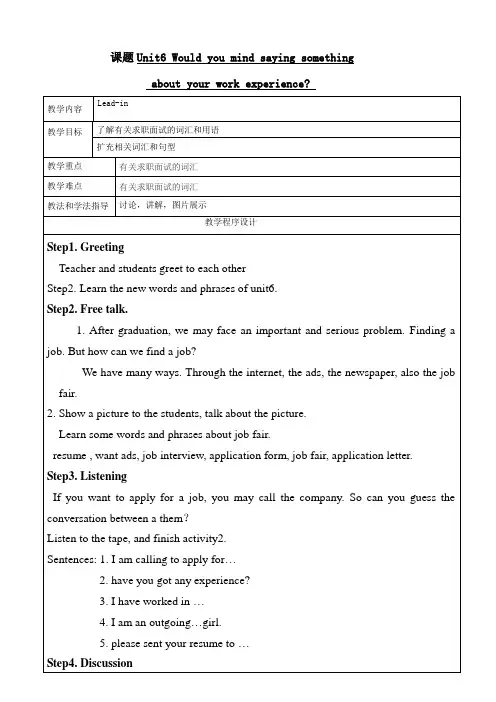
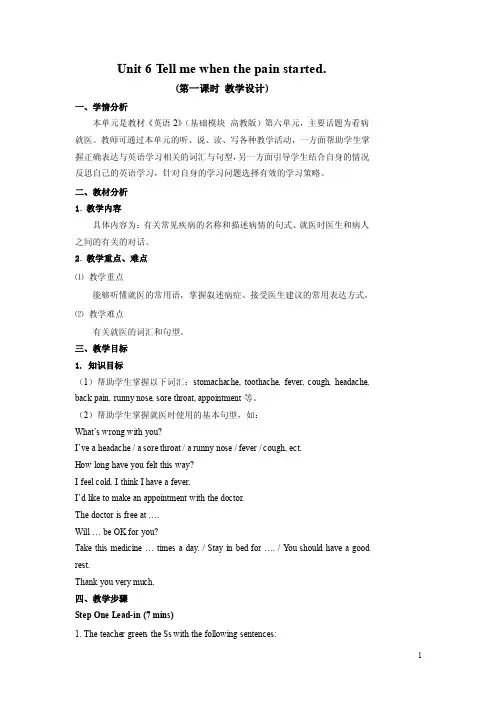
Unit 6 T ell me when the pain started.(第一课时教学设计)一、学情分析本单元是教材《英语2》(基础模块高教版)第六单元,主要话题为看病就医。
教师可通过本单元的听、说、读、写各种教学活动,一方面帮助学生掌握正确表达与英语学习相关的词汇与句型,另一方面引导学生结合自身的情况反思自己的英语学习,针对自身的学习问题选择有效的学习策略。
二、教材分析1. 教学内容具体内容为:有关常见疾病的名称和描述病情的句式、就医时医生和病人之间的有关的对话。
2. 教学重点、难点⑴教学重点能够听懂就医的常用语,掌握叙述病症、接受医生建议的常用表达方式。
⑵教学难点有关就医的词汇和句型。
三、教学目标1.知识目标(1)帮助学生掌握以下词汇:stomachache, toothache, fever, cough, headache, back pain, runny nose, sore throat, appointment等。
(2)帮助学生掌握就医时使用的基本句型,如:What’s wrong with you?I’ve a headache / a sore throat / a runny nose / fever / cough, ect.How long have you felt this way?I feel cold. I think I have a fever.I’d like to make an appointment with the doctor.The doctor is free at ….Will … be OK for you?Take this medicine … times a day. / Stay in bed for …. / Y ou should have a good rest.Thank you very much.四、教学步骤Step One Lead-in (7 mins)1. The teacher greets the Ss with the following sentences:How are you, boys and girls?I didn’t sleep well last night.I’ve had a cold because ….I’m not myself today.Explain I’m not myself today and get the Ss to say something about themselves. Step T wo Listening and speaking (30 mins)1. Before listening, ask the Ss to look at the picture and answer the question: What’s wrong with the boy in the picture?2. Activity 3: Listen and answer the questions.Listen to the tape and answer the questions. Listen again and then check the answers.3. Activity 4: Listen again and complete the card.4. Activity 5: Read and underline.Read aloud after the tape and then practice the dialogue in pairs. Get some pairs to act it out.Underline the sentences about illness and check in class.Step Three Summary (6 mins)Make a short summary of what we’ve learned today.(1) Useful expressions: have a stomachache / toothache / fever / cough / headache / back pain / runny nose / sore throat, make an appointment, etc.(2) Everyday English:What’s wrong with you?I’ve a headache / a sore throat / a runny nose / fever / cough, ect.How long have you felt this way?I feel cold. I think I have a fever.I’d like to make an appointment with the doctor.The doctor is free at ….Will … be OK for you?Take this medicine … times a day. / Stay in bed for …. / Y ou should have a good rest.Step Four Homework (2 mins)1. Practice the dialogue in pairs and recite it..2. Make up a dialogue with your partner.五、板书设计Unit 6 T ell me when the pain started.(第二课时教学设计)一、教材分析1. 教学内容具体内容为:阅读有关描述病人病情的小短文,填写病人病历,并根据病情编写医生和病人之间的对话;撰写英文病假条。

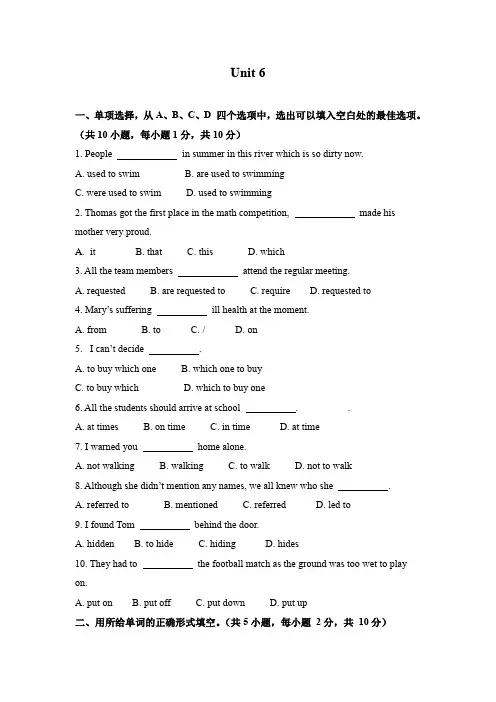
Unit 6一、单项选择,从A、B、C、D 四个选项中,选出可以填入空白处的最佳选项。
(共10小题,每小题1分,共10分)1. People in summer in this river which is so dirty now.A. used to swimB. are used to swimmingC. were used to swimD. used to swimming2. Thomas got the first place in the math competition, made his mother very proud.A.itB. thatC. thisD. which3. All the team members attend the regular meeting.A. requestedB. are requested toC. requireD. requested to4. Mary’s suffering ill health at the moment.A. fromB. toC. /D. on5. I can’t decide .A. to buy which oneB. which one to buyC. to buy whichD. which to buy one6. All the students should arrive at school . .A. at timesB. on timeC. in timeD. at time7. I warned you home alone.A. not walkingB. walkingC. to walkD. not to walk8. Although she didn’t mention any names, we all knew who she .A. referred toB. mentionedC. referredD. led to9. I found Tom behind the door.A. hiddenB. to hideC. hidingD. hides10. They had to the football match as the ground was too wet to play on.A. put onB. put offC. put downD. put up二、用所给单词的正确形式填空。
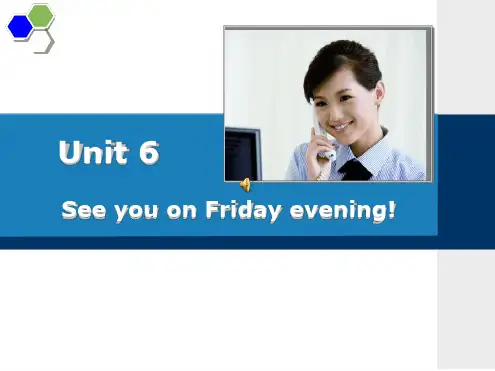
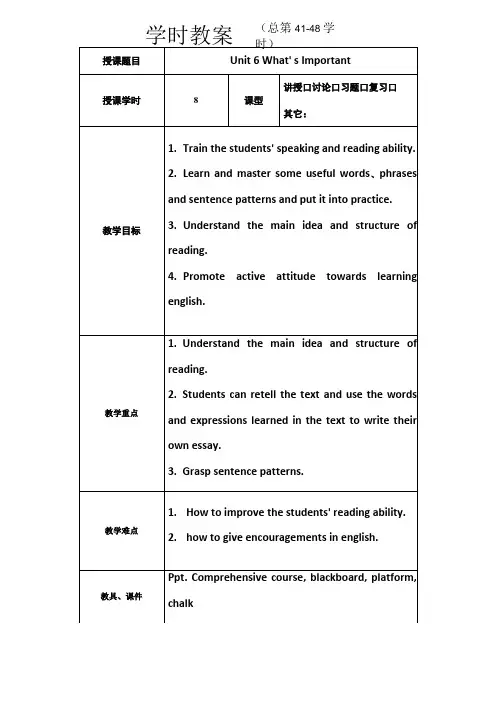
(总第41-48学1-2学时:Stepl: GreetingsGreet students cheerfully to cheer them up for this English lesson.Step2: Tell students the general arrangements of classroom teaching and learning and their tasks in this class.Step3: teaching the pronouciation of the new words and phrases and give expanlation to them.• 1. earn one, s living=make one, s living 谋生earn money=make money 赚钱• 2. remind sb. of sth.使(人)想起… remind sb. to do sth.3.unless = if ... not除非,如果不e.g. We will go shopping unless it rains. =We will goshopping if it doesn,t rain.4.instead of , instead 代替:反之,e.g. We can usestone instead of wood.It,s too hot. We didn,t goshopping. Instead, we wentswimming.重点:难点:e.g. My book is different from yours. be the same ase.g. My book is the same as yours.6.accept, receive (主观)接受;(客观)收到I received some flowers yesterday. But I didn' taccept them.7.afford to do sth.Can' t afford sth.买不起・a・Can' t afford to do sth e.g. We can' t afford ( to buy) a largehouse.8.be proud of = take pride in 为…而骄傲e.g. We are proud of you.=We take pride in you.9.on earth 到底;究竟e.g. What do you want to do on earth?10.go for a ride (开车)去兜风go for a walkStep4: Do the warming-up part.Show some pictures about money on the ppt for students, and give explanation to some words and phrases:1)Do you think money is important?2)Do you like to wear famous brand clothes?3)What do you think of life, easy or difficult?text.• 1. Why did the son dislike his father and feel unhappy?• 2. Why do young people like to wear famous brand shoes an d clothes?• 3. Can everybody in a country get rich at the same time?• 4. Is it true that all foreigners are rich?• 5. What do you think is most valuable for you?Task2 ScanningRead the text again and then find detailed information.•1.( F)The boy' s father earn much money.•2. ( T ) Young people in Italy like to wear famous brand shoes and clothes.•3. ( F) All the people can become rich at the same time.•4. ( T ) According to the text, we know that life is difficult for most people.•5. (T) Canada is known as a rich and developed country.•6. ( F ) Money is important than anything else.. Task3 Language Points and Sentence Structures1.This reminds me of Italy, when it was still a developingcountry。
2016年河北省职业院校信息化教学大赛语文出版社中职英语拓展模块Unit6 Chinese HeritageReading: Beijing Opera (Period Two)教学设计2016年8月14日Unit 6 Reading Beijing Opera 教学设计一、教学内容分析本课选自语文出版的中等职业教育课程改革国家规划新教材全国中等职业教育教材审定委员会审定《英语(拓展模块)》Unit 6 National treasures Reading。
是满足中职学生个性发展和继续升学需要选修的公共基础英语教学内容。
主要围绕Beijing Opera这一话题展开的,讲述了京剧的历史、特点、角色、象征、名角名家等,为中职生了解、学习、传扬中国传统文化艺术提供了良好的契机。
新课程标准强调英语教学要从学生的生活经验和认知水平、兴趣出发,倡导体验,实践、参与、合作与交流的学习方式和任务型教学途径,发展学生的综合运用能力。
作为一单元的核心和基础部分,本节教学重点是提高学生阅读能力及如何通过阅读获得知识、运用知识的能力。
因本课文较长,内容较为深奥,在有限的时间内,如何在以阅读为主的教学过程中引导学生学习语言知识并运用这些知识进行语言交际、交流成为本课的难点。
为此教师要在教学中把握重点,突破难点,为下面的Speaking and Speaking和Writing部分提供语言输入,奠定了内容基础和能力基础。
二、教学目标分析根据教学大纲的要求以及授课对象确定教学目标如下:1.知识与技能目标(1). 在学习和掌握30个hot words and 10个useful expressions 的用法基础上,通过阅读从历史、特点、角色等五个方面了解京剧,引导学生理解、感悟京剧艺术。
(2).逐步提高阅读能力和交流沟通能力;培养学生对京剧的欣赏能力。
2. 情感与态度目标(1).通过课堂教学音频、视频欣赏、文本阅读、课堂练习,学生们了解,并喜欢聆听和观看京剧,陶冶情操,增强艺术民族自豪感。
中等职业学校英语拓展模块Unit6作者及工作单位王蕊北京新城职业学校一.教材分析本课是中等职业学校拓展模块Unit6 Keeping Fit第一课时。
本单元的中心话题是危害健康的各种疾病和如何保持健康,本课时是要掌握生活习惯和健康的关系,哪些是好的,对健康有益的生活习惯,哪些不好的,对健康有危害的生活习惯,不好的怎么来改正。
主要语言结构为:情态动词should和should not是本节重点,要求学生能够用should和should not 给他人提建议。
通过本课的学习进一步培养学生养成良好的生活习惯和保持健康的重要性的意识。
二.学情分析我教学的对象是中职二年级的学生,学生一小部分基础属于中上水平,中下水平的占了相当一部分,他们学习英语既感到好奇又担忧,希望能得到他人的肯定。
因此我在教学活动中尽量让他们参与到活动中来,有更多的机会来说英语,减少他们的恐惧感,通过学生间的合作学习,降低他们的学习难度,使他们体验到成功的喜悦。
同时自主学习和小组交流中加以落实,提高他们综合运用语言的能力,使各层次的学生都有所收获。
三.教学目标1.知识目标:1)词汇: 学生能够识读balanced、gym、overweight、fitness、junk、lung cancer,、tobacco、appetite等词汇。
2) 句型: 学生会使用You should/ shouldn’t… 的句型给别人建议。
2.语言技能目标:学生能简单使用所学句型给别人关于如何保持身体健康的一些建议,并通过此课程为自己设立一个健康的生活计划。
3.情感态度目标:1)培养学生对生活的热爱,养成良好的生活习惯。
2)能通过自己的知识帮助别人,培养学生的自信心。
四.教学重点和难点教学重点:词汇、词组搭配和句型的运用。
教学难点:You should/ shouldn’t…/You may not…/You are not to…/You may begin to…等句型的学习,并能在实际情景中简单地运用以上句型来给别人建议。